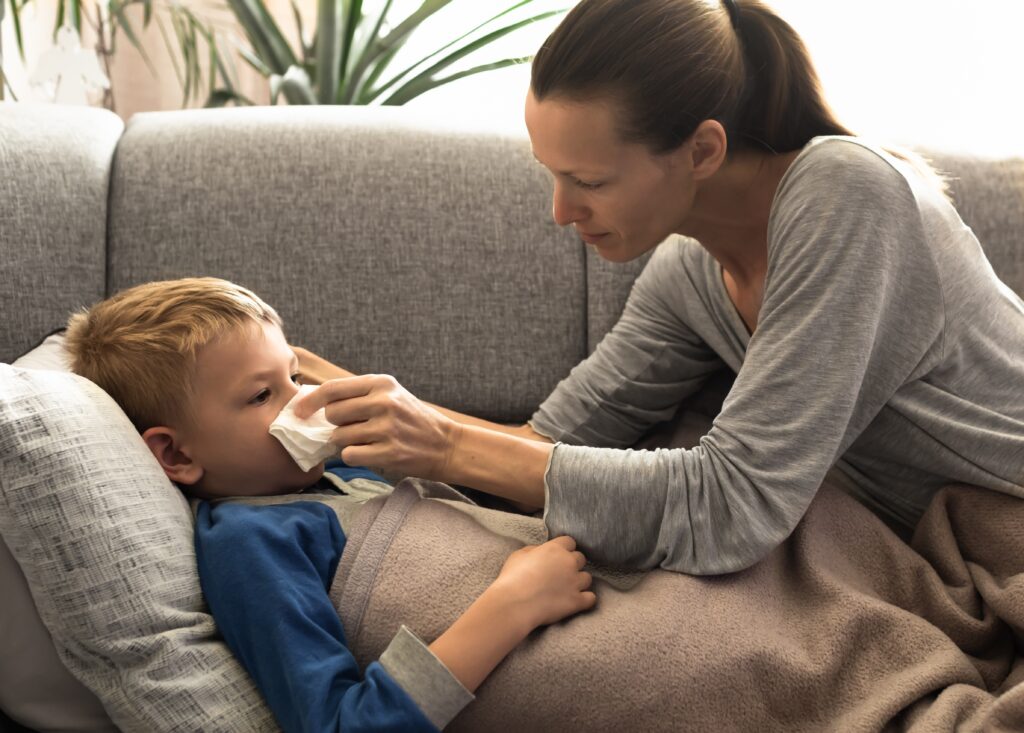By Lauren Crosby, M.D., FAAP, member of PanTheryx’s scientific advisory board

It’s that time of year again—pediatric offices are getting busier. We are seeing an uptick in illnesses, which will likely continue to increase as the weather gets cooler and people congregate indoors more, and often without following the prior COVID-19 prevention measures. Frequent handwashing, wearing face masks, and avoiding large crowds of people shielded children from being exposed to many viruses, including RSV and the flu. The children who were protected from illnesses over the past two years are now getting sick at the same time. This is not only causing a huge uptick in-office visits and hospitalizations in the pediatric population, but understandably, a lot of anxiety among parents. With the impending holidays, families want to make up for lost time over the past two years, but they also want to prevent spreading illnesses to other family members, get well quickly, and stay well. I’m fielding many questions at my practice, so I’m sharing answers now to the most common concerns I’m hearing with the hope they help you and your family stay healthier this cold and flu season.
Why does my child get sick so often in daycare, preschool, especially during their first year of attendance?
Let me reassure you that as frustrating as this is for parents, even pre-pandemic frequent illnesses were occurring. The immune system must be challenged so it learns how to respond to illnesses and so it builds the innate immune system. Typically, a child will have 8-12 illnesses per year because of the constant close contact with other children. But not only does that mean they miss many days of school, but they may also get other siblings sick, and caregivers often miss work because they are sick themselves or are at home taking care of their sick child. Usually, during the second year of preschool, the number of illnesses decreases because of prior exposure to many viruses during that first year. Keep in mind that because some of these illnesses can last up to 2 weeks or even more, it feels like they are always sick.
What can I do to prevent my child from getting sick so often?
No parent wants to see their child suffer. There is only so much you can do to dodge the germs while still engaging in social activities. Remember, getting sick trains the immune system to potentially decrease the frequency, duration, and spread of illnesses. With this said, there are best practices all families should follow:
- Wash your hands for at least 20 seconds using soap and water. Hand sanitizer can substitute for soap and water when necessary.
- Keep up to date with all recommended childhood immunizations including a yearly flu shot.
- Disinfect frequently touched surfaces like doorknobs, faucets, countertops, and toys.
- When possible, keep away from others who are sick.
- Teach kids to cough and sneeze into their elbow.
- Wear a face mask in crowded indoor locations. Face masks are safe for children ages 2 years and up.
- Eat a healthy varied diet rich in fruits and vegetables.
- Add supplements that have published research showing immune support and that your pediatrician gives your child the green light to take.
There are two products that I recommend. One is TruBiotics probiotics. Its sugar-free children’s gummies and chewable tablets contain the most clinically researched probiotic strains to support digestive and immune health for children. These strains have been shown in several studies to decrease the risk of gastrointestinal and upper respiratory tract infections, and to decrease the frequency of these infections.
The other product is Life’s First Naturals colostrum. Clinical studies have shown that the composition of colostrum from cows is almost identical to human colostrum. Both contain protective proteins, immune factors, and prebiotics. The protective proteins help support your child’s natural defenses so they can recognize and ward off foreign invaders. The immune factors help support a balanced and healthy immune response. And prebiotics promote the growth of beneficial bacteria in the gut, where more than 70% of the immune system resides.
If, and when, should my child get the flu vaccine?
Everyone 6 months of age and older should get a flu shot every year. Influenza (“the flu”) causes thousands of deaths each year in the United States as well as other complications such as pneumonia, ear infections, and sinus infections. The virus changes yearly, which is why we need to be vaccinated every year. The flu vaccine can dramatically decrease complications and hospitalizations from the flu. In fact, we are seeing the flu hit earlier than in prior years so don’t wait. If you still haven’t received the flu vaccine, it is not too late to get it in November or after.
What types of over-the-counter products should I keep in my home to be ready for cold and flu season?
Make sure all the following are in your home and none of them are expired.
- Infants’ or children’s acetaminophen for fever, pain
- Infants’ or children’s Ibuprofen for fever, pain, inflammation
- Saline nasal spray
- Nasal aspirator
- Pedialyte and Pedialyte popsicles
- Honey can be very effective for coughs in children over 12 months old; do not use in children under one year of age
- Cool mist humidifier
Remember that kids do get sick. While it’s unavoidable, it does build the immune system over time. Their illness frequency will eventually decrease. Though having a sick child at home is always difficult, there are strategies to mitigate symptoms as well as to help prevent getting hit with the constant barrage of illnesses we are seeing. A few simple steps can make a difference!